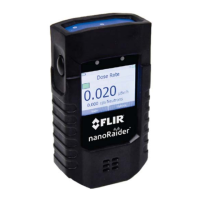FLIR Detection D. Glossary
Element
Pure substance consisting of ÚNuclides having the same number of ÚProtons (also known
as ÚAtomic Number) sharing the same chemical properties. The nuclear properties differ if
the number of ÚNeutrons varies in the nuclides (ÚIsotope).
Also known as: Chemical Element
Equivalent Dose
A measure of the radiation ÚDose absorbed by tissue where an attempt has been made to
consider the different relative biological effects of different types of ÚIonizing Radiation.
The equivalent dose is calculated by weighting the ÚAbsorbed Dose with a factor selected for
the type and energy of the radiation. The weighting factor ranges from 1 for ÚGamma Radi-
ation and ÚBeta Radiation to higher values for ÚAlpha Radiation, ÚProtons, and ÚNeutrons.
eV ÚElectron Volt
Extensible Markup Language
ÚXML
False Alarm
An ÚAlarm not caused by a radioactive source under the speciied background conditions.
False Alarm Rate (FAR)
The number of ÚFalse Alarms per duration.
FAR ÚFalse Alarm Rate
Fast Neutron
ÚNeutron Temperature
FGPu ÚFuel-Grade Plutonium
Fission
An exothermic nuclear process in which a ÚNucleus is usually absorbing a ÚNeutron and two
ission fragments and a few ission neutrons emerge.
Also known as: Nuclear Fission
Fuel-Grade Plutonium (FGPu)
A mixture of
239
Pu,
240
Pu and other ÚIsotopes, which contains between 7 % and 19 %
240
Pu.
Further grades are ÚReactor-Grade Plutonium and ÚWeapons-Grade Plutonium.
Full Width at Half Maximum (FWHM)
The full width at half maximum height of a ÚPeak in a ÚSpectrum (Figure 242, p. 274).
identiFINDER
®
R300/en/2014.4(13623)/Feb2015 273

